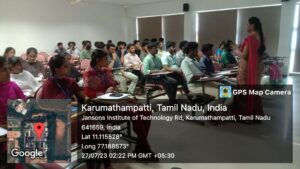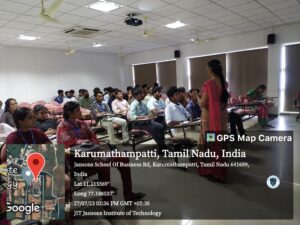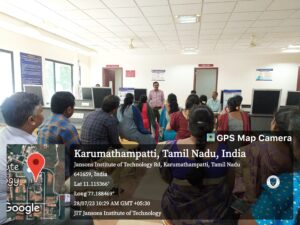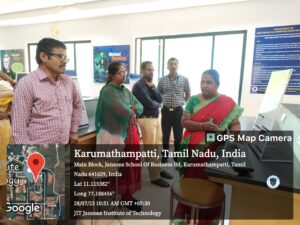A skill development bootcamp on “Prototype Prodigies : Empowering Students with PoC Development Skills for Product Design”
The objective of the bootcamp is to equip students with essential skills in prototype development and aims to empower participants with the knowledge and tools necessary for product design through Proof of Concept (PoC) development. By fostering an environment of hands-on learning and innovation, we strive to cultivate a new generation of adept creators capable of transforming ideas into tangible prototypes, thereby bridging the gap between concept and product realization. Through collaborative sessions, mentorship, and practical exercises, this bootcamp endeavors to instill confidence and proficiency in students, enabling them to navigate the complexities of product design with expertise and creativity.
A skill development bootcamp on “Prototype Prodigies: Empowering Students with PoC Development Skills for Product Design” has been organized by IIoT Club in association with JIT-IIC and NDLI club on 14.03.2024, 21.03.2024, 28.03.2024, 04.04.2024 at IoT Tinkering Lab.
Day 1 : 14.03.2024
Session 1: Embracing Prototyping in Design thinking & Innovation – Importance of prototyping in the design process
Ms. S.Svaanika, II ECE B student, addressed the gathering with the welcome address and unveiled the chief guest profile. Mrs.N.Krishnapriya, AP/ECE, Innovation Ambassador, JIT, illuminated the critical role that prototyping plays in transforming abstract ideas into tangible, testable products, thereby fostering innovation. The speaker shared valuable insights into the evolution of design thinking and its impact on modern-day problem-solving. It not only equipped students with valuable design thinking skills but also inspired them to adopt innovative approaches in their future endeavors. The students actively posed queries, while the expert graciously responded to all of their questions.
Session 2: Introduction to Proof of Concept (PoC) – Ideation Workshop
Ms. S.Svaanika, II ECE B student, unveiled the chief guest profile. Mrs.P.Sivamani, ASP/ECE, Innovation Ambassador, JIT, initiated the workshop with an engaging presentation that outlined what a Proof of Concept is and its importance in the product development lifecycle. The session highlighted the difference between PoC, prototype, and pilot, clarifying common misconceptions. Participants were introduced to various ideation techniques designed to spur creativity and generate viable ideas for development. Techniques such as brainstorming, SCAMPER, and mind mapping were demonstrated, offering attendees practical tools to enhance their ideation processes. The resource person shared methods for assessing the market need, technical feasibility, and financial viability of ideas before committing to the development of a PoC. The event concluded with a Q&A session, where participants engaged directly with the resource person, asking specific questions related to their projects and ideas.
Day 2 : 21.03.2024
Session 1: Overview of different prototyping methods – Introduction to prototyping tools
Ms. Vasanthapriya, II ECE B student, addressed the gathering with the welcome address and unveiled the chief guest profile. Dr.C.Shanmugam, ASP/ECE, Innovation Ambassador, JIT, underscored the importance of prototyping in validating concepts, refining ideas, and communicating designs effectively. The resource person delved into the intricacies of various prototyping methods, ranging from low-fidelity sketches to high-fidelity digital prototypes. The resource person also provided an overview of various prototyping tools, catering to a wide range of fidelity levels and use cases. The event concluded with a Q&A session, where attendees had the opportunity to ask the resource person specific questions about challenges they face in prototyping.
Session 2: Prototyping Best Practices – Hands-on demo of a selected prototyping tool
Dr.C.Shanmugam, ASP/ECE, Innovation Ambassador, JIT, kicked off the session with an insightful overview of prototyping, discussing its importance in iterative design, user testing, and stakeholder communication. The speaker outlined key strategies for effective prototyping, including fidelity considerations, user involvement, and feedback loops. The core of the workshop was the live demonstration of the Prototyping Tool. Participants were guided through the process of setting up a project, creating interactive elements, and simulating user interactions. The resource person shared tips and tricks for leveraging the tool’s advanced features to streamline the prototyping process. The presentation concluded with a vibrant Q&A session, where participants engaged with the resource person, seeking advice on specific challenges and clarifications on the tool’s functionalities.
Day 3 : 28.03.2024
Session 1: Rapid Prototyping Workshop – Hands-on session to create rapid prototypes
Ms. S.Svaanika, II ECE B student, addressed the gathering with the welcome address and unveiled the chief guest profile. Mrs.A.Berlin, AP/ECE, Innovation Ambassador, JIT, outlined the fundamental concepts and benefits of rapid prototyping, emphasizing its critical role in today’s fast-paced product development cycle. The core of the workshop was the highly interactive hands-on session. Attendees were divided into small groups, each tasked with developing a prototype based on pre-defined project briefs. This session fostered a collaborative environment, encouraging creativity, innovation, and practical problem-solving among participants. The resource person provided personalized feedback to each group, highlighting the importance of iteration in the prototyping process. Participants learned how to refine their prototypes based on feedback and testing, a key lesson in the development of viable products.
Session 2: Prototyping for Different Platforms – Case studies of successful prototypes
Mrs.N.Krishnapriya, AP/ECE, Innovation Ambassador, JIT, kicked off with a comprehensive introduction to the importance of prototyping in the design and development process. The resource person emphasized how prototypes serve as a bridge between initial concepts and the final product, allowing teams to explore ideas and iterate quickly. The core of the session was dedicated to presenting a series of case studies on successful prototypes. Each case study highlighted the challenges faced during the prototyping phase, the solutions implemented, and the outcomes. These real-world examples spanned across web, mobile, and wearable platforms, providing attendees with a broad perspective on prototyping practices. The resource person shared insights into choosing the right tools based on the project’s needs and how to leverage these tools to create effective prototypes quickly. The event concluded with a hands-on workshop, allowing participants to apply the learned principles and techniques.
Day 4 : 04.04.2024
Session 1: Insights into real-world product development and prototyping – Pitch Preparation – Tips & Techniques
Ms. Puvitharani, II ECE B student, addressed the gathering with the welcome address. Mrs.N.Krishnapriya, AP/ECE, Innovation Ambassador, JIT, elucidated the various stages involved in product development, emphasizing the importance of thorough research, prototyping, testing, and iteration. Practical insights were provided into prototyping techniques, including rapid prototyping, 3D printing, and mockups. Real-world case studies and examples were presented to illustrate the concepts discussed. Participants gained valuable insights from successful product development stories and learned from common pitfalls encountered during the process. The session delved into the art of crafting persuasive pitches that resonate with investors, stakeholders, and potential customers. Practical tips were shared on structuring pitches, storytelling techniques, and addressing key pain points. The event concluded with an interactive Q&A session, allowing the participants to seek clarification on specific aspects of product development and pitch preparation.
Session 2: Final Presentation by teams
The event commenced with a brief introduction by the juries, outlining the objectives and rules of the presentation. Following this, each team was given a designated time slot to present their idea. Several teams participated, each comprising enthusiastic individuals eager to showcase their innovative ideas. The presentations covered a wide range of topics, including technology, social initiatives, sustainability, and more. Teams utilized multimedia tools, prototypes, and visual aids to effectively communicate their concepts. The atmosphere was filled with enthusiasm and energy as teams passionately pitched their ideas. The presentations were followed by interactive Q&A sessions, allowing participants to delve deeper into the concepts and provide feedback. A panel of judges, comprised of experts from relevant fields, evaluated each presentation based on criteria such as creativity, feasibility, impact, and presentation skills. The judges engaged in constructive dialogue with the teams, offering valuable insights and suggestions. The Idea Presentation event was a resounding success, providing a platform for teams to showcase their creativity and ingenuity. It fostered collaboration, inspired innovation, and encouraged participants to think outside the box.
Ms. Puvitharani, II ECE B student, presided the vote of thanks and thanked all the resource persons and participants for making the event highly enriching and insightful.














